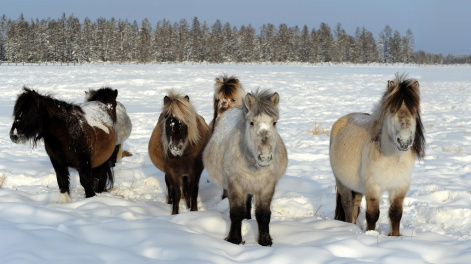Siberian scientists: the uniqueness of Yakut horses is due to the peculiarities of their nutrition
13 March 2020 г.

Why are the Yakut horses unique? As concerns biological standards, they have lived in the harsh Siberian climate not so long ago – only for the last few hundred years. In this short time, animals have adapted to cold and long winters. Scientists have suggested that they are able to survive in such harsh conditions, owing to an unusual diet among other things. To test their hypothesis, a team of researchers from several Siberian cities studied the composition and content of fatty acids in cereals growing in natural pasture areas, and in the tissues of horses.
Horses in Yakutia store fat from the end of summer until mid-autumn, feeding on still growing cereals. Young shoots develop at temperatures just above zero degrees and produce polyunsaturated fatty acids (PUFAs), including omega-3 alpha-linolenic and omega-6 linoleic acids. They are often called indispensable, since many higher animals, including humans, are unable to synthesize these acids themselves and must receive them with food. In a body, from these acids various physiologically valuable compounds are formed which are necessary for the normal functioning of the heart and blood vessels, brain and other systems.
Measurements performed by the scientists show that an essential acid, alpha-linolenic one, is especially abundant in over-wintering cereals, brome (Bromus inermis) and common oat. Plants need it in cold weather in order to maintain vital activity. This useful compound from cereals enters the organism of animals, being accumulated in fat. Apparently, due to a high content of alpha-linolenic acid, adipose tissue performs its functions better at extremely low air temperatures. It protects the animal and is used as an energy source.
The meat of Yakut horses is also rich in this omega-3 acid. In terms of human nutrition, it is dietary because it contains the same amount of omega-3 and omega-6 PUFAs. The value of this ratio is associated with a reduced risk of developing cardiovascular diseases. For comparison, in hamburgers there are twenty times more omega-6 acids than omega-3 ones. Such food can hardly be called healthy since an excess of omega-6 acids can lead to adverse effects on human health.
“Our work has an important practical result. It can be concluded that moving Yakut horses to stalls (and feeding) will lead to a decrease in the nutritional value of horse meat for local residents and will probably decrease the survival of horses in the extreme conditions of Yakutia, ” concludes the co-author of the article, Doctor of Biological Sciences, senior researcher at the Institute of Biophysics KSC SB RAS, Associate Professor of the Siberian Federal University - Olesya Makhutova.
Share:
